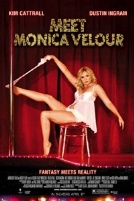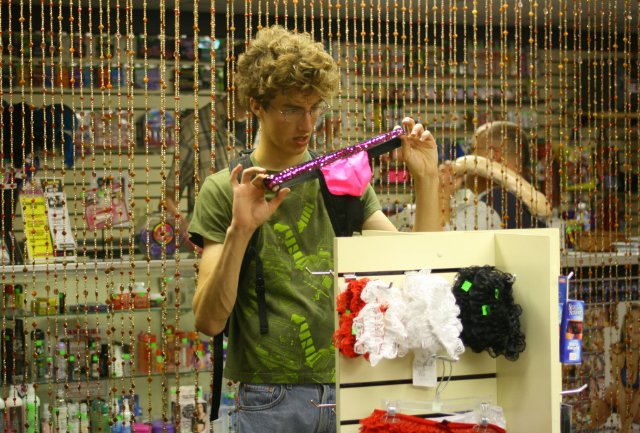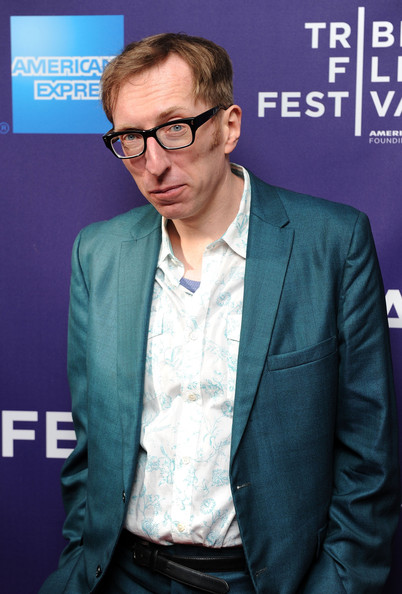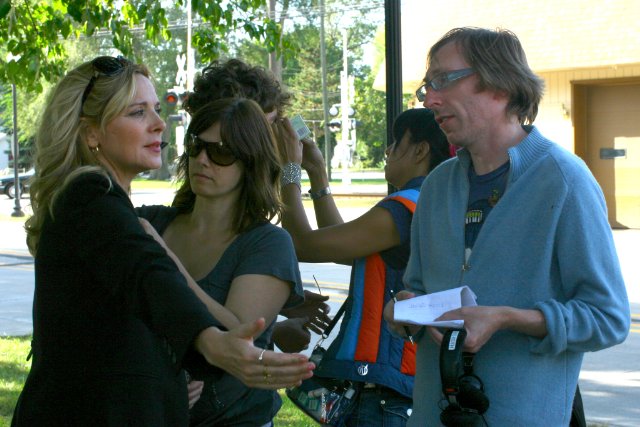 Last year, while covering the 2010 TriBeca Film Festival, I saw a little indie called Meet Monica Velour, the feature debut of writer/director Keith Bearden. I learned a lot that day. I learned that a guy who was in my shoes, a film journalist, could become a filmmaker. I learned that Kim Cattrall isn’t stuck in Sex and the City mode; she’s out there on stage and in smaller films doing great work that’s sadly under-seen. I also learned of young Dustin Ingram, a fine actor who shares frames with Cattrall, Brian Dennehy and Keith David in Meet Monica Velour and steals nearly every scene he’s in with them.
Last year, while covering the 2010 TriBeca Film Festival, I saw a little indie called Meet Monica Velour, the feature debut of writer/director Keith Bearden. I learned a lot that day. I learned that a guy who was in my shoes, a film journalist, could become a filmmaker. I learned that Kim Cattrall isn’t stuck in Sex and the City mode; she’s out there on stage and in smaller films doing great work that’s sadly under-seen. I also learned of young Dustin Ingram, a fine actor who shares frames with Cattrall, Brian Dennehy and Keith David in Meet Monica Velour and steals nearly every scene he’s in with them.
That’s the great thing about film festivals in general: they open your eyes to a whole new world of films flying under the radar. Films that are a great alternative to the kind of studio schlock that permeates the multiplexes of America. This weekend, if you’re not interested in seeing pot-smoking Knight’s or yet another remake that shouldn’t have been done, check out Meet Monica Velour, a film with as much heart as its director and star have potential.
I was lucky enough to catch up with Bearden and Ingram nearly a year after I saw their film for the first time last week and talk about where they came from, where they’re at now and where they’re going. Check it out below:
Dustin Ingram: So (in your review) you called (my character) Tobe “the bastard child of Napoleon Dynamite and Johnny Depp’s Willy Wonka”. I understand the Napoleon Dynamite part, where do you see Willy Wonka?
DH: Well it’s more from a physical standpoint. You’re got a kind of wirey frame. You’re hair was all out there and everything. There’s a bit of weirdness to the character.
DI: Oh he’s off.
DH: He’s definitely a bit off-kilter. Look, I’m a collector of random things myself but his specific focus of what he’s into is not what the typical American teen is into now. He’s a very eclectic person and that’s what I liked about it. Keith must have written a very awkward person to begin with.
DI: From page to screen the character went through a lot of evolution. He’s nostalgic without having anything to be nostalgic about. He was just born nostalgic. He loves the best cars from the ’50s, the best movies from the ’70s, the best music from the ’30s. And I wish you could see more of his room because it’s so specific. There’s an Ethel Merman disc album and Captain Beefheart poster. We don’t focus on them too much but just enough in the panning shot. Anybody who is into this smorgasbord of pop culture has to be an individual. And I thought he doesn’t want to live in the now, he doesn’t want to be here now, he wants to live in the past. He missed the days of dressing up and putting on tails and a suit and wearing gloves. He missed all that. He’s out of place.
DH: I saw the film at Tribeca last year. You were there, [director] Keith was there and it was probably my favorite film I saw last year at the festival. How has your life changed between then and now.
DI: It’s been three years in total since we wrapped which has been excruciating because Keith has been working on it 5 or 6 years even before we started shooting. It’s been a part of our lives for a long time, but in the last year a lot has changed. We’ll get really personal here if you want. April 1st marks the anniversary of the day my past relationship ended and it’s weird how we broke up during the TriBeca Film Festival and now a year later it’s premiering. It’s very strange. It’s weird, there’s a lot tied to this. A lot has changed. I’m not really sure what exactly, but I’m sensing it.
DH: You’re a young guy and you shot the film years ago where you were sharing the screen with Brian Dennehy and Kim Cattrall and Keith David – they’re all legends. Was there any intimidation on set?
DI: The night before I met Brian or Keith for the first time, I played it out in my mind and that was extremely intimidating and I would imagine what they would be like and what they’d say. These guys have been doing it for so long and I’ve only been doing it since I was five but not professionally and I didn’t have anywhere near as much understanding as they do. It was amazing, Brian would ask what kind of lens they were using and he’d go, “so about right here” and it was perfect every time. But I would arrive on set and be the most professional actor I could be and introduce myself to him. And one of the first things Brian said to Keith and I, “boy, look at the schnauzers on you two”. But they were so kind and so nurturing and Brian would just sit in the transportation van and talk to me about theater. He was a lot like my grandfather and I would ask him questions. Same thing with Keith David. It was amazing, like a magician revealing his secrets. But it was cool because a magician would only reveal their secrets to another magician he deemed worthy of their secrets, so it was quite humbling when he talked about his methods.
DH: From the inside looking out can you describe the relationship between Toby and Monica, or Linda, as that’s who she really is?
DI: The version of her is Monica, as much as Toby likes to think he knows who Linda is. At the point in his life depicted in the film he’s not able to grasp the shit going on with Linda. But he understands Monica; he sleeps with her every night. But I always saw it as his second chance at [having] a Mother which is great because he grew up without a Mom or a Dad. And I always saw Monica as a sexualized version of his mother. So he seeks her approval and her trust because it means the world to him since he never had that. So when he effects her life and she effects his life in a drastic way, Keith describes it as a page turn. I describe it as Tobe turning the table of contents and Monica closing the cover of her book. So that’s when it’s heartbreaking when he loses his mom for a second time.
Yet it’s two-fold because she’s acting as a fantasy girlfriend and probably the closest thing to a mom he’s ever had. He’s the most complicated character in the film, she has her complications with her family, but in terms of internal conflict he’s the most complex character. He’s awkward and disaffected and steadfast in his admiration for her. He does almost go to hell and back for her. She [Kim Cattrall] told me in the beginning of the film, “Oh that kid gets the shit kicked out of him everyday. And for some reason he cares about this woman do much he’ll talk back to these four guys who are clearly going to beat him up again”.
DH: Was that a part of the discussion when you were creating the character, the fact that there is so much going on within him?
DI: Keith and I talked about that and that was one of the things he asked me about in the call back. He didn’t like me in my first audition, he didn’t like me at all but the producers told him he needed more people. Apparently he asked all the kids if they had ever been in love at the callback and most of them said “no, I don’t really know what that is yet.” They were younger than me and I felt that I had been in love and he brought that up when talking about the complexity of Tobe. And he said “you’re a complex guy, you come from a very interesting background. A lot of things have happened in your life and if you trust that and allow that to ride on the words that Tobe says and on the actions he takes, it will be complex. You won’t have to make him interesting.”
DH: You’re life really did inform the character then?
DI: I’m not like Tobe, but I am. I was picked on in school. And I was into old things. So there were definitely parts.
 DH: I would imagine you’ve gotten more comparisons to Napoleon Dynamite, but you explore a lot more emotional depth than in ND. The real question is whether or not it bothers you or whether or not you embrace it? How do you take those comparisons?
DH: I would imagine you’ve gotten more comparisons to Napoleon Dynamite, but you explore a lot more emotional depth than in ND. The real question is whether or not it bothers you or whether or not you embrace it? How do you take those comparisons?
DI: When I get a break down for an audition, it usually says “awkward,” “geek” or “think Michael Cera”, that sort of thing. While it is frustrating, it is a blast to reinvent the nerd.
DH: It’s been done throughout the years and you’re taking it to a new level.
DI: The whole ND thing, it was really frustrating at first. Yes my hair is curly and I wear those glasses and I’m tall and lanky and naturally the first thing that comes to mind is a well-know pop culture reference. That is how people deal with life, you compare things to other things. Not to get too meta, but it’s like Monica Velour, people are going to look at her and judge her based solely on her looks and/or her past. So if people take the time to see it and really pay attention to it, it’s definitely a different performance and stands out. Our film has subplots and subtext in there.
DH: On subtext, I found that the greatest message in the film pertained to the hegemonic viewpoint towards women when they get to a certain age and we kind of discard them. Do you agree that that was sort of an intention of the film?
DI: It definitely is and Keith will tell you it was. I think it’s extremely important because Kim works all the time, so for the most part people haven’t thrown Kim Cattrall out but with other actresses yeah that is the case. I’m most definitely a male feminist or a pro-feminist male. I think it’s extremely important and we’ve had discussions with feminists who have seen the film and are rooted in that community who see it for what it is. And if people sort of read a quick synopsis they’ll think it’s about a porn star with Kim Cattrall, it’ll be sleazy. But it’s so much more than that and it’s because of Keith.
DH: If you were going to set Tobe up on a blind date how would you describe him to that person?
DI: I would say to the girl, if Toby is still interested in girls at that point, he is a wonderful soul, he has the biggest heart in the world and if you let him in and accept him for who he is, you’ll experience the biggest love you’ve ever had. If he likes you, that is.
 DH: I was there at TriBeca last year, where you told the audience that you came from the world of film journalism. What’s it like going from my side of the table to yours?
DH: I was there at TriBeca last year, where you told the audience that you came from the world of film journalism. What’s it like going from my side of the table to yours?
Keith Bearden: It’s really good because I feel like being a film journalist is like being in film school. I went to film school but film school is taught by failures. As a journalist, you get to sit on a couch and have 20 minutes with Wener Herzog, John Sayles or Scorsese and even if it’s only 20 minutes you’re getting real experience from people who know what they’re doing and know the reality of the film business and the reality of day-to-day shooting. You know there are people who are teaching film school who haven’t shot a movie. They know how to thread a Bolex camera or cut in Avid but they don’t have experience with the creative process. It’s really great, it’s helped me prepare. Also, I think to succeed in art in this time in America you have to be completely devoted to it. Cinema is like my church. Immersing myself in the history, it’s like studying the Torah, to talk to all these great filmmakers, you’re getting history, art, wisdom, that was all really important. I almost feel like actual film school is superfluous.
DH: You also mentioned the different elements of learning the Torah. Of course we all had to learn to read Hebrew and understand the preciseness of the language, but for me the best part was always the stories. It’s the richness of those biblical stories that probably brought me here today, the love for stories and storytelling. It’s not so much about whether or not you can set up the tripod the right way, but it’s about knowing what’s a compelling story.
KB: People don’t care about whether you’re the best DP in the world. People are attracted to stories. Years ago I spoke at the Art Institute and was talking to the kids about their projects and one guy was like “I have a movie and want to get a feature made” so I asked whats it’s about. And he’s like “it’s just like Mean Streets, the Scorsese movie.” And I was like “Mean Streets is on DVD. Tell me a story that’s new and that’s yours. If you’re just doing something that’s like something else…look, getting a movie made is so impossible and if you get your one or two or five movies out there at least do something new and different and something they can’t already get. It’s not like the old days when you do a remake of a movie from ten years ago when people couldn’t get to see the first movie. You can see everything now.
DH: In terms of film journalism versus screenwriting, what’s the biggest difference/challenge in going from critical to creative writing?
KB: It’s a really good exercise to write down why a movie works and why it doesn’t. That really helps when you’re structuring or editing your own movie. You develop that critical mind and use it when you’re writing or directing. As far as creative writing it’s totally different. My script writing started to take off when I stopped journalism or slowed down on the journalism because it uses different parts of your creative brain. It’s about creating characters and not analyzing characters; it’s the same coin but a different side.
DH: I guess there aren’t as many rules. You’re not adhering to a formula. You don’t have to get inside their head because you’re making their head.
KB: Exactly. The loose ends of a script, a very important part of the script, a lot of the stuff that goes into you writing a script doesn’t actually end up on the paper. I wrote a biography of Monica Velour, we talked about her history, her friends that you don’t see in the movie. There are plots written down for all the porno movies you see snippets of in the movie; it helps inform the movie and the character.
DH: The film holds Americana in such high regard. Was this love from your own youth or, again, did you totally disregard yourself and create it all?
Because kids have access to everything with the internet and CDs and DVDs, they have access to a lot more stuff. I don’t believe in irony so everything in the movie is something I like. I don’t think its funny to put something in that’s bad and pretend I like it. There are things in there that I’m not necessarily into; things like comic books and 70s porn. It’s just a situation that really told an interesting story. When you have someone who’s a sex object and never made a lot of money and that’s all she’s known. She’s not Marylin Monroe, who was also an actress, but what happens when we don’t want them anymore? That was the crux and 70s porn was a perfect example. Those women were stars, it’s not like it is now when every woman in Czechovslovakia has her own porn movie.
DH: …And people may have followed a star from film to film.
KB: There were like 10 of them and they were in real theaters and they were all over the world. So people really they had their names in the marquee and people knew who they were. It was the ultimate example of what happened to people like Brook Adams and Karen Allen. If you know movies from the 70s, they were huge. But who are they know?
 DH: I thought the real message, if there was one, at the heart of the film was about how the world looks at women past their prime, is that the message and was it deliberate decision?
DH: I thought the real message, if there was one, at the heart of the film was about how the world looks at women past their prime, is that the message and was it deliberate decision?
KB: Yeah, I always thought it was really weird that people like Harrison Ford and Sean Connery are always in action movies where women are swooning over them. How fucking old are they? Where’s the equivalent? Sean is very cool and is a dashing sex symbol in his 60s and 70s. Well, our society says that is still okay but now for women. That seemed like a ridiculous double standard and also it’s not the same in other countries. I work a lot in France and if you’re a sex symbol there then you’re one forever. Catherine Deneuve and Bridgette Bardot will always be sexy. I even have a friend in England who’s like 24 and met an old English sex icon, the English Marilyn Monroe who is now 75 years old and he was like, “I mean, she’s old but I thought I just gotta do it.” We don’t think like that in America.
We have a real double standard and no one really talks about it. The best way to do anything is to do a little bit of a fairy tale and if I made a documentary about it, it would be dreadful and only people that agree with it would see it. Porn is something that’s extreme enough and distant enough from what most people think about that you can use it like a fun house mirror to look at ourselves. I’d rather do that than normal people having this existential crisis about getting older. I’d rather have an exaggerated reflection because, let’s be honest, porn chews women up and spits them out. They have 2, 5, maybe 10 years, whereas the men will always work.
DH: With this interview I’m very much introducing you to the world, because not many people out there know of you. So I was wondering if you can talk a bit about your influences?
KB: I started out watching horror movies as a kid. I loved monster movies, Godzilla, I was just a horror movie fan. And science fiction. I saw star wars in the theater when I was young and that really blew my mind. I haven’t seen it since i saw it as a kid and don’t want to see it again. But I think my influences, the movies I really liked that informed me, American and European 70s films, all the odd humanistic tones in those film. I loved a lot of exploitation, I loved Russ Myers, the genre directors, John Carpenter. And i also loved the comedies of the 30s. Comedy was really in its prime then: W.C. Fields, the Marx Bros, Mae West, the Little Rascals. There’s a moment in Monica Velour that is directly copied from the Rascals. I love German new wave, Werner Herzog, America indies. Being a film fan is like being a music fan. You might start off heavy metal, that’s what you like when you’re young but then you start to listen to their influences and you hear other people who can play really good and you’re circle widens.
George Lucas always talked about the Seven Samurai and the Battle of Algiers; well i love Star Wars so I’ll watch those. Also I think the most important thing is to have a world perspective and I think that I try to bring a perception. The most important thing a movie can do is take you to a place you’re surprised you haven’t been to, like a dream. It isn’t normal, but it takes something normal and takes it to a weird place. That’s why dreams are so vivid. I wanted to make a movie that people could really wrap their heads around, a teenager falls for an old porn star, you want to take people to a surprising place whether it’s more thoughtful or more odd or you just want to do things in a different way.


